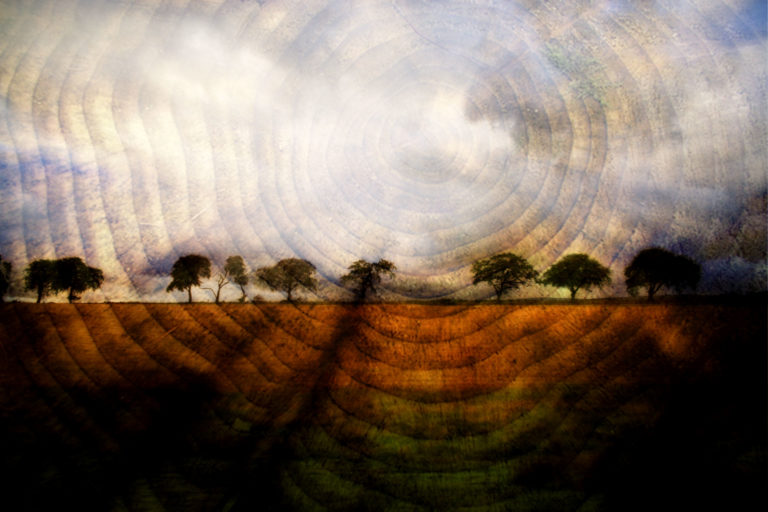
Image by Norma Desmond.
A Requiem for Trees
I have mixed feelings about trees these days.
It wasn’t long ago that for me — and for most of us, I suspect — trees were stalwarts: sturdy, reliable sources of beauty and cooling shade that we shamelessly took for granted. Trees took care of themselves, rarely asking much from us outside of the occasional trim. Now they seem to be the woody equivalent of canaries in the coalmine, telling us in the most dramatic way possible that our planet is terribly, terribly sick by dying themselves.
When I ride my bike through the forest preserve district down the street, I see bare limbs and toppled trunks. When I look up an ash or an elm tree, I no longer see a graceful canopy of green; I see death.
I am in despair over the formerly uncomplicated relationship I had with trees for most of my life; I am struggling to understand how to find some remnant of joy in their presence now that I mourn their questionable future and humanity’s role in making it so risky.
I have decided to grieve each dead tree I see as if it was a personal friend. Early this morning I heard a sound that’s become all too familiar: the roar of chainsaws as workers cut down a dead elm on the parkway near our home. We knew of its fate because yesterday a city worker had numbered and tagged it for removal. So after dinner last night my husband and I walked down the street to say goodbye to this beloved neighbor. It was a gorgeous late summer evening, lit by a supermoon still tinged with orange. The cicadas were humming their familiar chorus. We stopped under the tree and looked up.
Is it hokey to thank a mute being for everything it’s done for you? For oxygen? For cooling shade? For providing a home for birds? Sure, it’s hokey. But I think we need to collectively start grieving the loss of each and every tree. It’s only when we name our grief that it can begin to transform us instead of numbing us.
I performed a simple ritual for this tree that I’ve started doing for all the dead trees I see. I put my hands on its bark. I felt the rough texture under my skin. I looked up into the canopy, denuded of leaves, but still breathtaking in its shape and structure. I imagined it over a hundred years ago as a sapling, long before the street and its homes even existed.
I haven’t attended Mass in years, but I blessed it with the sign of the cross, a comforting remnant from my Catholic childhood. Making the strokes with my thumb is my way of saying: your life mattered. Your contributions were generous. You will be missed. And during absolute heartbreak, I celebrated a moment of exquisite pain: I am still alive. I can make a difference in the name of this tree. I must.
Psychotherapist Miriam Greenspan writes eloquently about the despair that comes from living on a planet seemingly in its death throes. Part of our response to our grief is to name it, honor it, and learn to live in its shadow; part of our response must be to find some small measure of healing through action. In her book Healing through the Dark Emotions, Ms. Greenspan reminds us of the potential of sorrow to change us for the better:
“Grief has a tremendous power. When we submerge it in avoidance, we can’t use it for spiritual growth. Allow grief’s power to propel you.”
My grief has propelled me to an unexpected place for a woman who had rarely gotten her hands dirty in a garden. Even as I continue my vigil of farewell to the dead and dying trees in my community, I am taking classes to become an ambassador for the urban forest through an organization called Openlands. I will be certified to care and plant trees on public land, advocate on their behalf with local government officials, and talk to my neighbors about why trees matter to them and the actions they can take.
I cannot bring back the trees that are gone. The loss of the American elm and the glorious archways they created on the streets of my childhood is something from which I will never recover. But out of that sadness can come a sense of hope when I pull on my gloves and my boots and do the audacious act of planting a tree.
